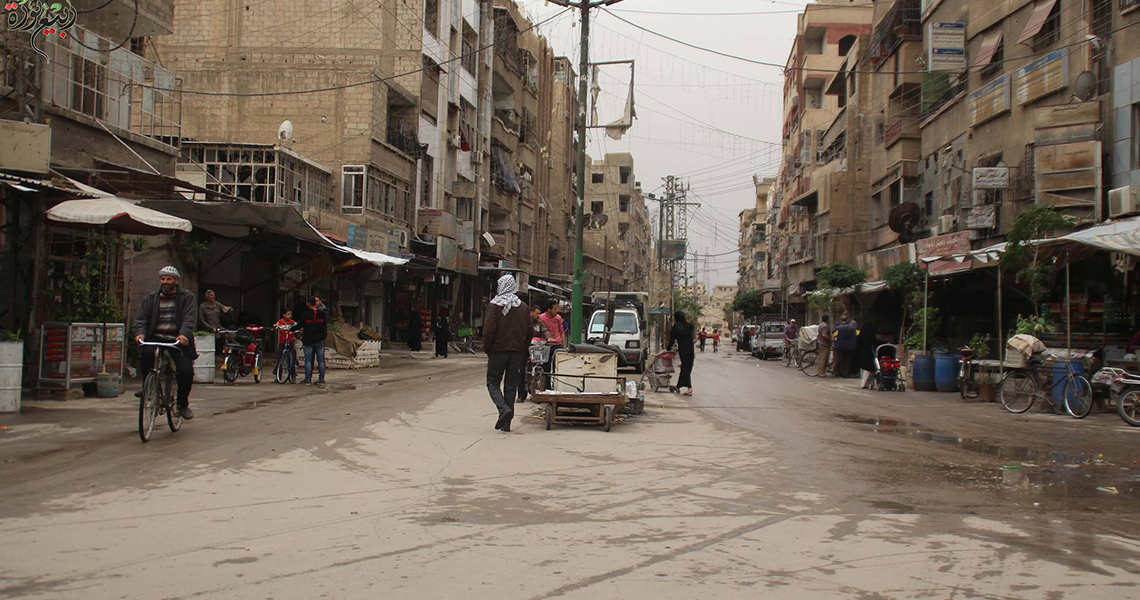The Syrian regular forces and departments under the Syrian government are yet preventing the residents of the al-Yarmouk Camp region and the neighborhoods of Tadamon, al-Hajar al-Aswad and al-Qadam, near the capital Damascus, from returning to their homes. In addition to this, the Damascus Provincial Council closed down and sealed more than a hundred houses in these regions, while appropriation cases of houses in the town of Aqraba by officers of the regular forces were recorded, according to testimonies obtained by Syrians for Truth and Justice/STJ. [1]
On November 1, 2018, under the pseudonym Issam, a civilian who owns a house in the Tadamon neighborhood told STJ:
“The Damascus Provincial Directorate prevented the people from renovating their houses at the Tadamon neighborhood after it announced the presence of 650 habitable houses in the neighborhood. However, it prevented the people from renovating their houses and sealed 150 houses. Elements of the regular forces, stationed at a checkpoint at the neighborhood’s entrance, prevented the people from entering it.”
Issam added that the majority of the sealed houses are possessed by Syrian government loyalists, which they left after the armed opposition groups took over the neighborhood and now live in the adjacent Tishreen neighborhood. The owners formed a representative committee that filed a complaint to the Provincial Directorate; they have also conducted a meeting with the governor, demanding that they be allowed to renovate their houses individually but to no avail.
On the same note, a young man from the Yarmouk Camp told STJ that elements at the Yarmouk Camp entrance’s checkpoint have informed the people who tried to enter the neighborhood that it will be totally demolished, starting from the gate to the entrance of the Yalda town. Moreover, the Damascus Provincial Directorate allowed people access to the camp for a single time only and for limited hours.
Another civilian, from the al-Yarmouk Camp, said that the Damascus Provincial Directorate is asking house owners to bring identity documents and documents proving their ownership of the properties inside the camp and southern Damascus’ towns to allow them to return to these regions.
About the situation in the town of Aqraba, Qais al-Shami, an activist interviewed by STJ on November 1, 2018, said that officers of the Syrian regular forces have appropriated ten houses in the town of Aqraba, the ownership of which belongs to anti-Syrian government persons, who are today based in Syria’s north. The owners were displaced from the town of Aqraba when the regular forces controlled it late in 2018 and lived in southern Damascus’ towns, which they also left in April 2018, following the reconciliation/settlement deal signed by the two sides to the conflict.
The activist quoted the house owners’ refusal to make any direct statements concerning the appropriation of their houses, as to spare their relatives in the town of Aqraba any harm; they have also stressed that they identify the officers who seized their houses.
Al-Shami added that about 150 families from the town of Aqraba were displaced to Syria’s north under the reconciliation/settlement deal, given that only 70% of Aqraba’s current population consists of its original residents, and the remaining 30% has been resettled in the past five years, as they are families to elements of the regular forces from different regions in Syria.
After May 2018, the Syrian regular forces allowed a few families from the town of Aqraba, which lived in southern Damascus’ towns, to return to the town, after they were subjected to thorough security examination, while the forces refused the return of dozens of families on the allegation of their having security-related issues, according to al-Shami.
On April 2, 2018, the Syrian government passed Law No.10, which provides for the construction of redevelopment zones throughout Syria that will be allocated to reconstruction. Covering this, Human Rights Watch published two separate reports addressing the violations encompassed in the law and the Syrian government’s prevention of the people’s return to several regions in rural Damascus. [2]
[1] The names and titles of all the witnesses in this report were not revealed at their request and for their own safety, given that they have been interviewed via the internet on the duration between October 25, 2018, and November 5, 2018.
[2] “Q&A: Syria’s New Property Law”, Human Rights Watch, last visit: February 3, 2019. https://www.hrw.org/news/2018/05/29/qa-syrias-new-property-law#_What_is_Law.
“Syria: Residents Blocked From Returning: Government Demolishes Homes, Denies Property Rights”, Human Rights Watch, last visit: February 3, 2019. https://www.hrw.org/news/2018/10/16/syria-residents-blocked-returning.

